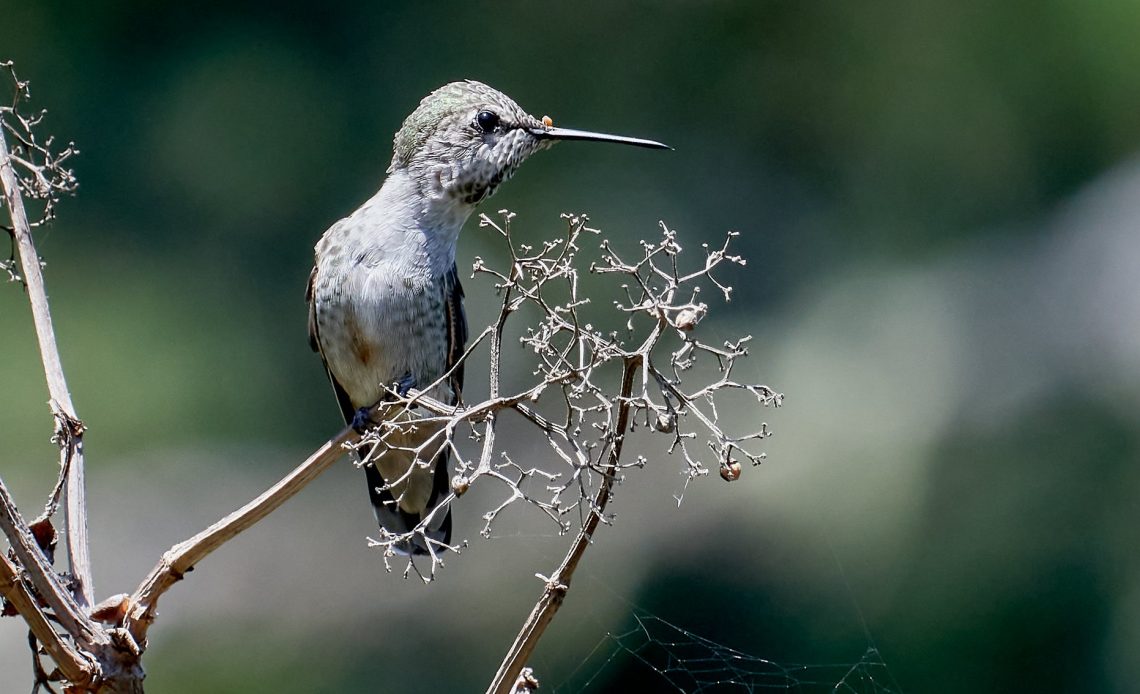

We’re here to help! Wild Yards is a completely free website that is 100% dedicated to helping you create a wildlife-friendly, sustainable yard. Read more
WildYards is reader-supported. When you buy a product through a link on our site, we may earn a comission. Every product is independently selected by our (obsessive) editors and our reviews are unbiased and objective. Read more about our mission or our privacy policy.
When compared to insects, spiders have very few predators to worry about. But this is not the case when compared to birds or other animals in the wild. Hummingbirds enjoy eating insects for protein and minerals missing from nectar, but apart from insects, do hummingbirds eat spiders?
Yes, hummingbirds will eat spiders, granted the arachnids are small and not dangerous enough to overpower the birds. Spiders provide hummingbirds with large amounts of protein and essential vitamins and minerals not provided by nectar. Although insects are typically the most common preference for a hummingbird, spiders are a convenient substitute if insect populations are low in an area.
Why Do Hummingbirds Eat Spiders?
When you think of hummingbirds, it is easy not to associate them with other birds. After all, hummingbirds are beautiful, small, and delicate, and are almost always drinking nectar. But their dietary needs stretch beyond nectar or sugar water. Protein, vitamins, and minerals from animal protein are also essential.
This is why spiders provide a quick and easy meal for foraging hummingbirds. Although insects like flies or aphids are typically preferred over spiders, if a spider is small enough, a hummingbird will eat it.
A hummingbird’s diet can vary depending on the availability of different sources of nutrients. So it is possible that hummingbirds may choose to vary between insects and spiders to add variety to their diet.
So now that you know hummingbirds like spiders, it is important to know which spiders these birds prefer to eat.
More often than not, hummingbirds will feed on small spiders. Spiders that do not have webs are also ideal since this prevents the birds from getting caught in a web. Furthermore, if insect populations are low, and nectar from feeders goes bad or is absent, feeding on small spiders can be a great way for the birds to get nutrients.
How Do Hummingbirds Catch Spiders?
An interesting behavioral trait of hummingbirds is their constant need to fly and hover, and in fact, they do not stop flying except to sleep. To catch spiders, hummingbirds will fly and hover over a web and wait for the right moment to snatch the arachnid with their beaks. But more commonly, the birds will pick webless spiders off of leaves and tree branches.
Spiders are easy to catch because they cannot fly and remain stationary. So all a hummingbird has to do is be quick enough to grab a spider if the arachnid has the ability to jump.
Hermit hummingbirds, for example, are known to forage for and feed on spiders exclusively over insects. This is due to their long and curvy beaks that can access different angles to pick off a spider through hummingbird gleaning.
For spiders with webs, the gleaning process is a bit more cautious. A hummingbird will hover to the side of the web to prevent the spider from leaping forward. Gleaning from the back of the web is also avoided as this could ensnare the hummingbird in the web.
But more often than not, you can expect hummingbirds to target webless, small spiders on leaves and tree branches.
Do Hummingbird Feeders Attract Spiders?
Similar to hummingbirds, spiders also tend to get pigeonholed as insect-eaters exclusively. Spiders actually eat other types of organic matter, and this includes nectar.
If you have honeysuckle in your yard, you may observe both hummingbirds and spiders feeding on the nectar in these plants. But hummingbird feeders can also attract spiders.
Feeders provide much easier access and typically less competition with other arachnids or insects for plant nectar. You have no doubt likely noticed insects around a hummingbird feeder before, and perhaps a spider or two. But noticing spiders on a feeder is rare, and conditions would need to be convenient for a web-based spider to draw nectar from a feeder.
But smaller spider species, such as jumping spiders, can easily feed from a hummingbird feeder. This would likely occur at night when hummingbirds are resting in their nests.
Do Hummingbirds Use Spider Webs?
Spider webs make great binding material for hummingbird nests. The sticky and durable organic material can encase leaves and twigs to create the walls of a hummingbird nest.
Hummingbirds will typically forage for abandoned spider webs to collect for a nest. Although a live nest is also viable after a hummingbird eats the spider.
To adequately transport the spider web, a female hummingbird will encircle the web around her beak or attach it to her breasts for easy transport. Once at the nesting site, the hummingbird will unravel the web and methodically wrap the web around leaves and twigs to construct the nest walls.
Do Spiders Catch Hummingbirds?
On the flip side of this question, there are also some spiders that will catch and even eat hummingbirds.
Orb-weaving spiders construct their webs with a circular, orb-like pattern in the center where they rest. These species are also known as garden or yard spiders, and their tropical colors are a highlight to gardens and yards during spring and summer.
Although these spiders do not have high concentrations of venom, there is enough of the toxin to paralyze and kill hummingbirds. This is commonly seen when a hummingbird lands in an orb spider web by mistake.

Good information.
Today I went out and a small beige spider was floating in my hummingbird feeder. I had just filled it the night before. Should I panic and take it down right away to dump out and refill?